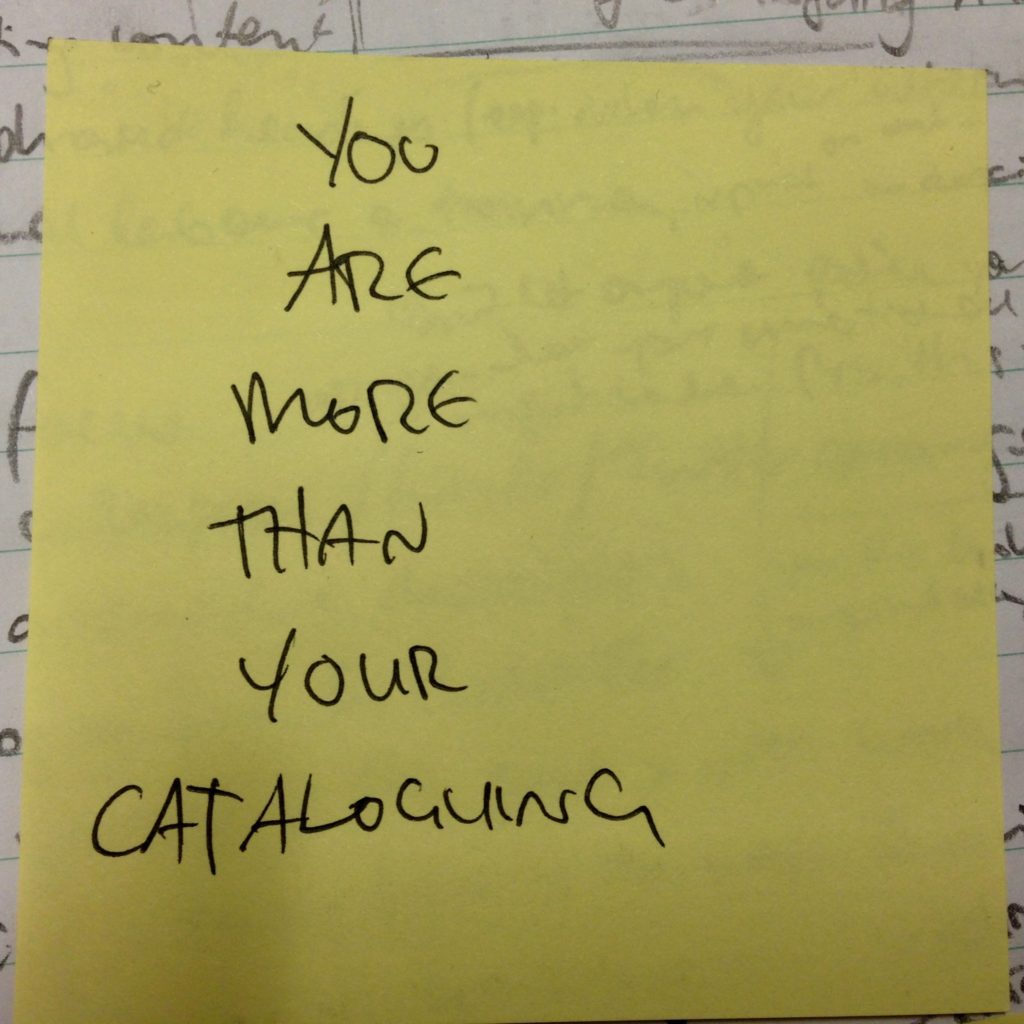
It has been a very difficult couple of weeks. I have not been my usual self. I can blame cataloguing for most of it. I could also partly blame #APLIC18, the recent tripartite LIS conference on the Gold Coast, which a lot of my friends attended and which stoked a serious case of epic fomo. But that’s very much a background issue. It’s taken me a while to process everything that’s gone on and try to find a more well-lit path. I’m aware half the office reads this blog, but at the same time, there’s nothing here I wouldn’t say to my boss. So here goes.
I am not my work. Any more. Last week was quite bad. I had an unexpected encounter with traumatic and poorly-phrased LCSH, which I am looking to change. I was also very ill, both physically and mentally, and spent a lot of time in bed. I have struggled recently with a sudden and severe change in my relationship to my work, as well as how I approach cataloguing, because cataloguing is my life, and also my job. I found it harder to enjoy. I had trouble getting up in the morning. I felt my perspective narrowing. I leaned very heavily on friends for support. Last Wednesday, I hit the wall. And the wall collapsed on top of me.
I know, intellectually, that it isn’t healthy to derive so much personal fulfilment and meaning from one’s work. And yet I do it anyway, because I have learned this about myself, that I operate this way. I used to love cataloguing. Used to. I don’t love it, currently. It grieves me that I say this. I hate that I have become this person.
I now speak about my passion for cataloguing in the past tense, and it kills me.
I would like the old me to come back. I think it could happen. Perhaps it is already starting to happen, a little. I don’t know how long it might take (days? weeks? months?) or how it might come about. But I would like to try and rekindle my love of cataloguing, because without it I don’t recognise myself. I feel hollow and without purpose. It’s a hole that my other interests can’t quite fill.
Perfect is the enemy of the good. I have learned a lot about myself over the past few weeks. I had previously thought I was okay at cataloguing, having more or less staked my career on it. I recently received a lot of feedback that suggested otherwise. I looked for a sign that I was doing something (anything!) right, that I was not completely hopeless at what I thought I was good at. A sign did not appear. I worried that I had somehow lied to everyone. It was imposter syndrome writ large.
Most people will read this and say ‘honestly, Alissa, what did you expect? What did you think cataloguing entailed? It’s standards all the way down’. I am not a hardcore standards enforcer and I never have been. My perspective on cataloguing is informed by user needs. What do users need from our catalogue? What metadata will connect an item with a search string? How can we best describe items (especially non-online resources) in meaningful and accessible ways? I believe breaking rules makes records better. I also don’t care about a lot of things that other cataloguers care deeply about, like ISBD punctuation, a perfect set of fixed fields, or the exact phrasing of where a title statement has come from (‘Title from cover’, not ‘Cover title’, apparently!). A catalogue should only ever be a glorified finding aid. It does not need to be a work of art in its own right.
Obviously I would like to be a better cataloguer. I would also like to go to work and feel as if I can do something right. It has been immensely difficult reconciling this poor feedback with my previous estimations of my cataloguing ability, and by extension my estimations of myself as a person. To be fair, most of my errors are of the cosmetic variety, or relate to institution-specific policies that are new to me, rather than deeper systemic problems with access points and descriptions. But a perfectly standards-compliant record can also be functionally useless, and a colossal waste of a cataloguer’s time to produce. I still take my errors to heart. It took me three weeks to get a record past the quality checker. I will never be perfect. I should probably stop trying to be perfect.
It has been a hard lesson, though.

Invite yourself to the party. In an effort to ameliorate said conference fomo and improve my mood, I started a hashtag on twitter for those of us who couldn’t attend APLIC but wanted to be involved anyway. #APLICLeftBehind became a meeting point for people keen to have their say, while also serving as a useful heads-up to attendees that we were commentating from afar. I loved that non-attendees from all sorts of places popped in and kept it going, even when I wasn’t in a position to say much. The hashtag will even be making an appearance in the forthcoming (entirely unofficial) APLIC zine, curated by Rebel GLAM. And it didn’t cost me a cent.
My first ever contribution to a #zine #APLIC18 #APLICLeftBehind thx @kassi_grace @lissertations @_rebelglam look forward to seeing the digitised version deposited with @nlagovau #legaldeposit pic.twitter.com/bbyvWyplOs
— Libby Cass @ #APLIC18 (@misslibbyc) 2 August 2018
I have nothing to lose but my chains. They say libraries gave us power, but then work came and made us free. Many of us become librarians because we want to make a difference, to give back to our communities, to enrich the intellectual and social lives of library users everywere. Librarianship is heavy with ideology, tradition and dogma, and it weighs us down. I don’t think I expected to spend so much of my professional time a) navel-gazing b) fighting the man or c) thinking quite seriously about giving it all away. I certainly never expected I would lose my passion for cataloguing so quickly, and so severely.
I’m at the stage where I can catalogue more or less on autopilot (allowing for time to go back and correct my inevitable punctuation errors). I don’t want to be this person. I want to care deeply about my work. I want to fill my cataloguing with care and zest and a desire to do better. I don’t want to be crying while reading my old posts and tweets, remembering the cataloguer I used to be, and wondering where that went. If I can rekindle the passion for metadata that got me here—and right now that is a big if—I hope to free myself as much as possible from the expectations of other people and structures, and devote my energies to where I can get things done. It’s almost as if the structure and nature of librarianship sets us all up to fail, and that if we don’t realise this, we’re not paying enough attention.
People tell me I am more than my cataloguing. They’re not letting me fail. I wish I could repay this faith, but right now all I can offer is my gratitude. I don’t want to perpetuate a charade. I can’t keep pretending that everything is fine. I am not the cataloguer I used to be. But maybe, one day, I will be a better cataloguer. And I will have learned a few things.